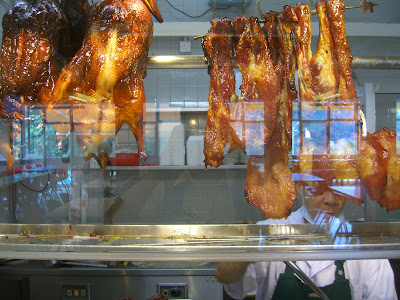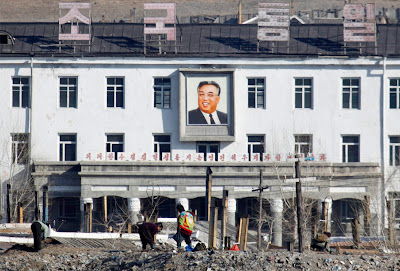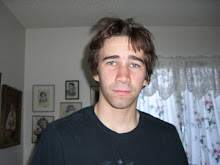Looking back at this experience, it has been tremendously informative as a cultural endeavor. However, academically, CUHK didn't leave me satisfied. Aside from my Chinese language courses, which were developed through a partnership with Yale University, my classes were neither engaging nor particularly instructive. I believe that is primarily the symptom of the classes being taught by non-native English speakers to classrooms of non-native English speakers. Everything felt distilled, and there was absolutely no student-teacher dialogues or interaction. Further, it is difficult to take a class seriously when the exam is rife with glaring grammatical errors. This was especially frustrating on True/False questions, where poor syntax made interpreting the precise meaning of the sentence guesswork.
I have been taking a graduate journalism workshop, and recently completed a profile of a former investment banker who switched jobs to work at a school. Here's my article:
With the highest density of skyscrapers in the world and one of the longest average workweeks, Hong Kong isn’t known as a Mecca for leisure and relaxation. In a recent struggle within Hong Kong’s legislative council over what sorts of democratic initiatives should be advanced, the pro-Beijing camp argued that Hong Kong, as an economic city, was full of profit-hungry go-getters that could care less about democratic reforms or, more largely, politics in general. As long as taxes are kept low and controls on the capital market are limited, the politicians argued, the citizens of Hong Kong would be satisfied. On the basis of Hong Kong’s global reputation, it is easy to take these sweeping generalizations at face value. However, glossing over Hong Kong as a city of dollars and cents belies the deeper struggles and triumphs of its citizens.
With such great emphasis on accruing wealth, an oft-encountered dilemma found within Hong Kong’s 7,000-plus high-rise buildings is striking a proper work-life balance. Lawyers, investment bankers, and businesspeople face ultra-competitive colleagues, and many times sacrifice any semblance of free-time, family, or friends in order to advance their careers.
Wayne Yuan, a fit thirty-something who lives in Po Lam and worked for Bank of New York for the last sixteen years is all too familiar with the heavy demands of a professional career. Mr. Yuan worked in trade finance and relationship management and says, “the top management only cared about profits and cost-cutting.” He added that the corporate atmosphere “put me under tremendous pressure to sell more, sell more, sell more.” Frequently, he would be asked to stay until midnight to complete a conference call with his New York associates, only to be asked to return at 8am the next morning.
We meet in his apartment, nicely appointed, but also, like most public housing in Hong Kong, excessively cozy. He sits on a piano bench in a small bedroom shared by his housekeeper and seven-year-old daughter Angel. He married his wife, a physical education teacher and librarian, in 1996. His other daughter, Annie, is twelve, and actively involved in pre-teen pursuits: texting and Facebooking.
Up until May, Wayne Yuan could have been described as just another suit, a hard-working, moderately wealthy executive biding his time in the office. Unlike many in Hong Kong, though, Wayne was unwilling to give up his health and family as payments towards advancing his career. After sixteen years of high-pressure sales, Wayne found a job at his wife’s secondary school, and now works as their accountant. “In Hong Kong, most people work their entire lives for a nice flat,” Wayne says. “But you have to find a balance between your job and your life,” he adds as he leans back against his daughter’s piano, still wearing his workout clothes from a game of racquetball with a colleague.
This philosophy put him at odds with the heavy demands of his banking career. For Wayne, the decision to change jobs was far from a knee-jerk reaction to a stint of unhappiness at work. In order to qualify himself for the accounting position, Wayne enrolled in City University of Hong Kong and took classes at night for the last few years. It seems, at first, counterintuitive for a man who values time with his family to commit himself to even more hours away from home. But, it becomes clear that his discontentment stems not from the number of hours worked, but the corporate culture to which he was subjected. After a number of mergers a few years ago, Wayne notes that “the old-style management, which focused on making customers happy, changed dramatically when the bank was taken over by a foreign firm.” He adds, “Later [post-merger], the top management no longer cared about making our clients happy. We were to push for more business, more money, before our clients began to trust us.” He adds, “The money might have been lower before, but at least our clients trusted us, and I enjoyed my job.”
The push for account growth became so fervent that Wayne felt his clients were becoming annoyed with how often he was required to call them. “If they need something, they will call me. Now, I have to call them twenty times a month, just to satisfy my managers,” he says.
There was no end to the calls for higher revenues, in Wayne’s eyes. “Top management demands five percent growth, so the lower management wants to impress them and demands ten percent,” he says. With a hint of desperation in his voice, he adds, “There is no need to maximize the profit. How do you maximize the profit? One million? Ten million? One billion?”
Working at the school couldn’t be farther from the intense ends-justify-the-means environment at the investment bank. Wayne doesn’t miss much from his old career. “My school does not have profit goals, daily meetings, or overbearing managers,” Wayne says. However, there is one aspect of his former life that was harder to give up. “The money is much, much worse now. I make less than half what I made at the bank,” he says. Wayne is saving far less now than in his previous career, but surprisingly, he doesn’t feel he has had to make drastic changes to his lifestyle. The family retained their live-in housekeeper, and they still manage to pay for private English lessons, piano lessons, and weekend trips to China.
So far, Wayne seems happy with his career change. “I am happy now. I feel better. At Bank of New York, I couldn’t escape the high stress,” he says, adding, “I have time to exercise. And, I have more time to communicate with my wife and kids. Although, my oldest daughter has started to outgrow her daddy.”
Wayne says that many of his colleagues at the bank want to leave, but find a career change financially unviable. “They can’t afford to leave, even though they are unhappy,” he says.
Under the shining veneer of gleaming skyscrapers and well-dressed executives, there lies in Hong Kong a sense of unease among some people unable to escape from the fast-paced structural pressures of their careers. Wayne represents, for Hong Kong, a seemingly rare success in managing the demands of a career without abandoning family, friends, and health.
“When you become a top manager,” Wayne cautions me, “please remember that it is not all about the money.” Perhaps Wayne doesn’t care about politics or democratic initiatives, but the members of the legislative council would be deeply mistaken in pegging him as just another profit-hungry go-getter.


























